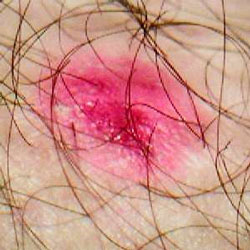
Top stories


ESG & Sustainability#BudgetSpeech2026: SRD grant unchanged, other Sassa social grants see hike
10 hours



More news












ESG & Sustainability
South Africa’s carbon tax should stay: climate scientists explain why










Up to one fifth of all children of school age have eczema, along with about one in 12 of the adult population. Anecdotal reports from patients have suggested that hard water may worsen atopic eczema. Population surveys have also suggested a possible link between atopic eczema prevalence and the degree of water hardness.
It had been hoped that water softeners would provide simple but effective relief for the many children who suffer from this itchy and uncomfortable condition. However, the trial - Softened Water Eczema Trial (SWET) - carried out by The University of Nottingham and published in the journal PLOS Medicine showed no objective difference in outcomes between the children whose homes were fitted with water softeners and those without.
The independent trial was run by a team of clinical and trial experts in the Centre of Evidence Based Dermatology. Working with experts from the water industry, and funded by National Institute for Health Research (NIHR) Health Technology Assessment (HTA) programme. A full report of the trial results is also published today, 16 February 2011, as part of the Health Technology Assessment journal.
The study recruited children and families living in hard water areas in Nottingham, Cambridge, London, the Isle of Wight, Portsmouth, Leicester and Lincoln.
Hywel Williams, Foundation Professor of Dermato-Epidemiology and Chief Investigator, said: "Although the outcome is disappointing in terms of future treatment options for children with eczema, the outcome of the trial is very clear; both the water softening and control groups improved equally in the study when the eczema was measured objectively. Despite this, some parents still believed that water softeners were helpful in eczema, and it is important to realise that other benefits of water softening in the home might be important for families too."
Children suffering from moderate to severe atopic eczema took part in the pragmatic, observer-blind 12 week trial. Participants were randomised by a computer into two groups - those whose families had a water softener installed and those who did not. Those who did not have the water softener were then given a softener to try at the end of the study.
The results surprised even the experts. Professor Williams said: "Our research had already shown that eczema is more common in primary school children living in hard water areas in the UK compared with children living in soft water areas. No one really knows why, but it could be because hard water contains high levels of calcium and magnesium, leading to increased use of soaps which can act as skin irritants. We would have been happier if we had shown a clear benefit of using water softeners. However, that is not the case, and we need to face the truth."
The severity of the disease can vary. In mild forms of eczema the skin is dry, red and itchy, whilst in more severe forms the skin can become broken, raw and bleeding - leading to sleep loss and a poor quality of life. Eczema is not contagious and with treatment the inflammation of eczema can be reduced, though the skin will always be sensitive to flare-ups and need extra care and protection against dryness.
The water softener industry (through their representative body, the UK Water Treatment Association) - was closely involved in providing expertise on technical aspects of water softening during the trial and a generic water softener has been specially produced for the study. The industry met the cost of producing and installing water softener units. However, the study findings are independent from any industry influence.
Tony Frost, Technical Director of the UK Water Treatment Association, said: "We are proud to have been associated with, and contributed towards this trial. We were very impressed with the professionalism and expertise of The University of Nottingham team under Professor Williams. The conclusions from the trial are sound and clear but the UKWTA was naturally disappointed with the outcome. Conventionally, water softeners are installed to prevent scale in water heating systems, and scum deposits on sinks and sanitary-ware but for many years, we have received, and continue to receive, reports from purchasers of water softeners that family member's eczema has improved since its installation.
At the end of each participant's trial period, they were given the option to purchase the softener at cost price; expectations were that uptake would not be significant but 66% of the home-owners opted to purchase. This was surprisingly high bearing in mind the socio-economic spread of the trial population. Unsolicited comments from trial participants on purchase ranged from "it has not affected our child's eczema but we love the other benefits of softened water" to "our child's eczema is completely cured - it has transformed our lives"
Source: http://www.nottingham.ac.uk/news/pressreleases/2011/february/watersoftenerseczema.aspx